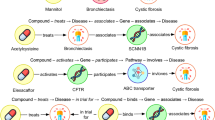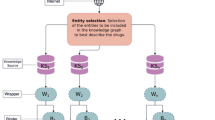Abstract
Studies on the structure–activity relationship of drugs essentially require a relational learning scheme in order to extract meaningful chemical subgraphs; however, most relational learning systems suffer from a vast search space. On the other hand, some propositional logic mining methods use the presence or absence of chemical fragments as features, but rules so obtained give only crude knowledge about part of the pharmacophore structure. This paper proposes a knowledge refinement method in the chemical structure space for the latter approach. A simple hill-climbing approach was shown to be very useful if the seed fragment contains the essential characteristic of the pharmacophore. An application to the analysis of dopamine D1 agonists is discussed as an illustrative example.
Preview
Unable to display preview. Download preview PDF.
Similar content being viewed by others
References
Daylight Chemical Information Systems: Daylight Theory: SMARTS Manual(2004), http://www.daylight.com/dayhtml/doc/theory/theory.smarts.html
Karwath, A., De Raedt, L.: SMIREP: Predicting Chemical Activity from SMILES. Journal of Chemical Information and Modeling 46(6), 2432–2444 (2006)
King, R.D., Muggleton, S.H., Srinivasan, A., Sternberg, M.J.E.: Structure–activity relationships derived by machine learning: The use of atoms and their bond connectivities to predict mutagenicity by inductive logic programming. Proceedings of the National Academy of Sciences 93(1), 438–442 (1996)
MDL: Drug Data Report, MDL, 2001.1 (2001)
Okada, T.: Rule induction in cascade model based on sum of squares decomposition. In: Żytkow, J.M., Rauch, J. (eds.) PKDD 1999. LNCS (LNAI), vol. 1704, pp. 468–474. Springer, Heidelberg (1999)
Okada, T., Yamakawa, M., Niitsuma, H.: Spiral mining using attributes from 3D molecular structures. In: Tsumoto, S., Yamaguchi, T., Numao, M., Motoda, H. (eds.) AM 2003. LNCS (LNAI), vol. 3430, pp. 287–302. Springer, Heidelberg (2005)
Okada, T.: Mining from chemical graphs. In: Holder, L.B., Cook, D.J. (eds.) Mining Graph Data, pp. 347–379. Wiley–Interscience, Chichester (2006)
Weininger, D.: SMILES, a chemical language and information system. 1. Introduction and encoding rules. Journal of Chemical Information and Computer Science 28(1), 31–36 (1988)
Author information
Authors and Affiliations
Editor information
Rights and permissions
Copyright information
© 2007 Springer-Verlag Berlin Heidelberg
About this paper
Cite this paper
Fujishima, S., Takahashi, Y., Okada, T. (2007). Pharmacophore Knowledge Refinement Method in the Chemical Structure Space. In: Corruble, V., Takeda, M., Suzuki, E. (eds) Discovery Science. DS 2007. Lecture Notes in Computer Science(), vol 4755. Springer, Berlin, Heidelberg. https://doi.org/10.1007/978-3-540-75488-6_23
Download citation
DOI: https://doi.org/10.1007/978-3-540-75488-6_23
Publisher Name: Springer, Berlin, Heidelberg
Print ISBN: 978-3-540-75487-9
Online ISBN: 978-3-540-75488-6
eBook Packages: Computer ScienceComputer Science (R0)




